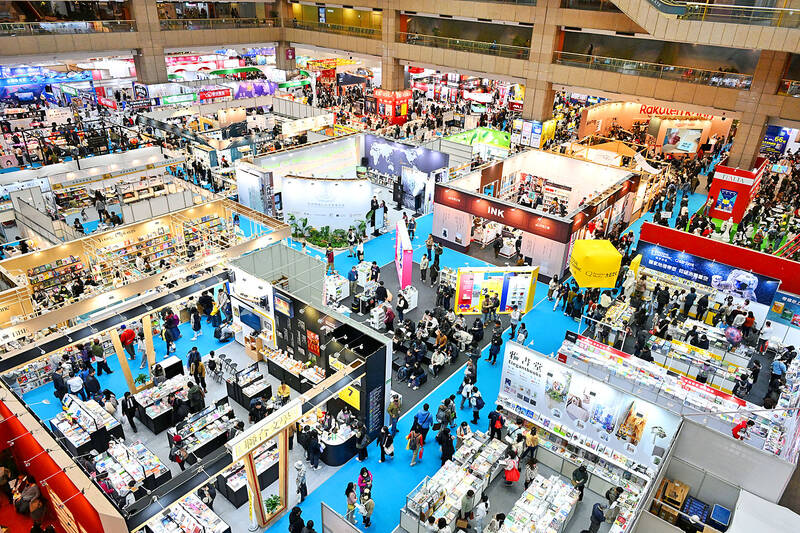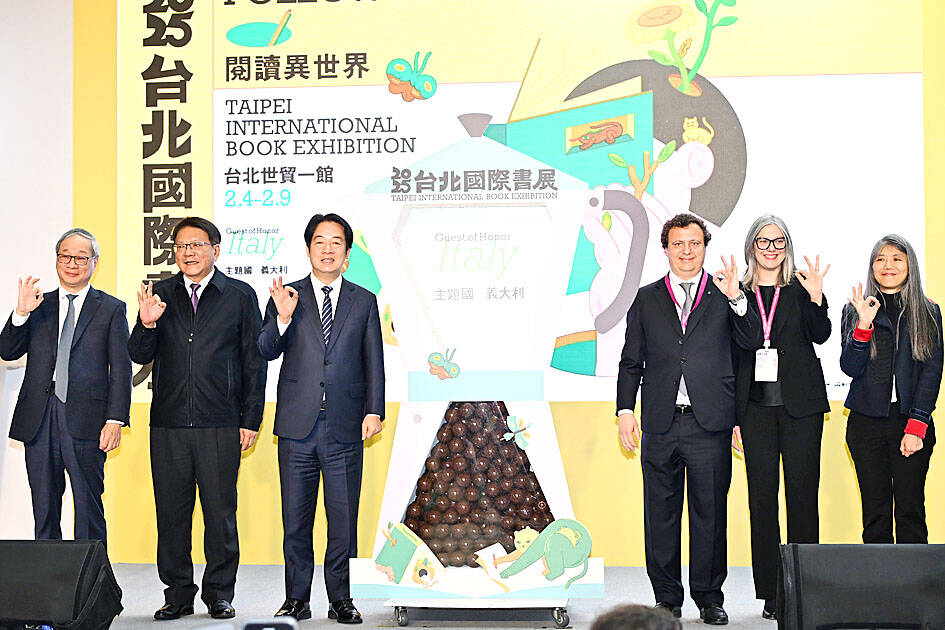More than 500 publishers from 29 countries are attending the Taipei International Book Exhibition this year, which opened at Hall 1 of the Taipei World Trade Center yesterday.
President William Lai (賴清德), Minister of Culture Li Yuan (李遠), Italian Economic, Trade and Cultural Promotion Office Representative Marco Lombardi and Presidential Office Secretary-General Pan Men-an (潘孟安) attended the opening ceremony.
“There is no guarantee for financial gains if you invest in the stock market, but gains are guaranteed if you invest in yourself by reading books. Knowledge is power, and it is worth it to buy and read books,” Lai told the opening ceremony.

Photo: Chen Yi-kuan, Taipei Times
“Culture is the root of the country and soul of Taiwan. Book publishers are important in transmitting culture. I thank and salute everyone in the publication industry,” he said.
The president also purchased 48 books after visiting different stands at the fair, from Taiwanese writer Ping Lu’s (平路) trilogy of Taiwan, the Taiwanese comic Day Off, an autobiography of Taiwan Semiconductor Manufacturing Co founder Morris Chang (張忠謀), The Evolution of Deliberative Democracy in Taiwan (台灣審議民主的進化時代) published by the National Taiwan University Press and the Chinese translation of US psychologist Jonathan Haidt’s The Anxious Generation: How the Great Rewiring of Childhood is Causing an Epidemic of Mental Illness.
Readers aged 18 to 22 can enter the exhibition free of charge with “culture coins,” Li said.

Photo: Hu Shun-hsiang, Taipei Times
The Ministry of Culture began distributing culture coins to teenagers aged 13 to 15 this year, with each person to receive 600.
However, due to budget cuts, they can only receive one coin in return if they use two at the fair, instead of two, Li said.
Readers in the previous exhibitions could redeem their admission fee by buying a book at the fair, but the benefit is now available only to those visiting on weekdays, Li said.
Li, who was a writer and screenwriter before serving as culture minister, also expressed hope that more Taiwanese books could be adapted into movies and TV dramas.
The book fair this year, with the theme “Follow Your Fancy in Reading,” features several pavilions, including those for independent publishers, non-governmental organizations, children’s books, digital and artificial intelligence (AI) publications, Taiwanese comics and publications from Italy, which is the theme country this year.
The exhibition is also presenting books published by Hong Kong writers, some of whom are scheduled to talk at forums during the show.
“Freedom, democracy, human rights and rule of law are vanishing quickly in Hong Kong, causing many of Hong Kong’s artists and writers to come and settle in Taiwan,” Mainland Affairs Council Minister Chiu Chui-cheng (邱垂正) said. “Creativity needs to develop in a free space, which has slowly disappeared. They can regain their creative freedom when they come to Taiwan.”
The digital pavilion features a story jointly created by eight writers with AI called The Hotel of Crossed Destinies.
The exhibition’s forums are also to feature authors from overseas, including Japanese writer Banana Yoshimoto, Italian writers Davide Cali and Fabiano Massimi, and Czech writers Magdalena Platzova and Marek Torcik.

US climber Alex Honnold is to attempt to scale Taipei 101 without a rope and harness in a live Netflix special on Jan. 24, the streaming platform announced on Wednesday. Accounting for the time difference, the two-hour broadcast of Honnold’s climb, called Skyscraper Live, is to air on Jan. 23 in the US, Netflix said in a statement. Honnold, 40, was the first person ever to free solo climb the 900m El Capitan rock formation in Yosemite National Park — a feat that was recorded and later made into the 2018 documentary film Free Solo. Netflix previewed Skyscraper Live in October, after videos

NUMBERS IMBALANCE: More than 4 million Taiwanese have visited China this year, while only about half a million Chinese have visited here Beijing has yet to respond to Taiwan’s requests for negotiation over matters related to the recovery of cross-strait tourism, the Tourism Administration said yesterday. Taiwan’s tourism authority issued the statement after Chinese-language daily the China Times reported yesterday that the government’s policy of banning group tours to China does not stop Taiwanese from visiting the country. As of October, more than 4.2 million had traveled to China this year, exceeding last year. Beijing estimated the number of Taiwanese tourists in China could reach 4.5 million this year. By contrast, only 500,000 Chinese tourists are expected in Taiwan, the report said. The report

Temperatures are forecast to drop steadily as a continental cold air mass moves across Taiwan, with some areas also likely to see heavy rainfall, the Central Weather Administration (CWA) said. From today through early tomorrow, a cold air mass would keep temperatures low across central and northern Taiwan, and the eastern half of Taiwan proper, with isolated brief showers forecast along Keelung’s north coast, Taipei and New Taipei City’s mountainous areas and eastern Taiwan, it said. Lows of 11°C to 15°C are forecast in central and northern Taiwan, Yilan County, and the outlying Kinmen and Lienchiang (Matsu) counties, and 14°C to 17°C

STEERING FAILURE: The first boat of its class is experiencing teething issues as it readies for acceptance by the navy, according to a recent story about rudder failure The Hai Kun (海鯤), the nation’s first locally built submarine, allegedly suffered a total failure of stern hydraulic systems during the second round of sea acceptance trials on June 26, and sailors were forced to manually operate the X-rudder to turn the submarine and return to port, news Web site Mirror Daily reported yesterday. The report said that tugboats following the Hai Kun assisted the submarine in avoiding collisions with other ships due to the X-rudder malfunctioning. At the time of the report, the submarine had completed its trials and was scheduled to begin diving and surfacing tests in shallow areas. The X-rudder,